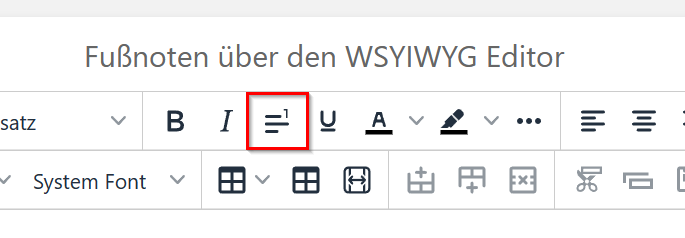Fußnoten über den WSYIWYG Editor
Fußnoten können mit folgendem Code aktiviert werden:
<script>
// Take a footnote anchor and convert it to the HTML that would be expected
// at the bottom of the page in the list of references.
function footnoteToHtml(elem) {
const newWrap = document.createElement('div');
const newAnchor = document.createElement('a');
const sup = document.createElement('sup');
const text = document.createTextNode(' ' + elem.title.trim());
sup.textContent = elem.textContent.trim();
newAnchor.id = elem.getAttribute('href').replace('#', '');
newAnchor.href = '#';
newAnchor.append(sup);
newWrap.append(newAnchor, text);
return newWrap.outerHTML;
}
// Reset the numbering of all footnotes within the editor
function resetFootnoteNumbering(editor) {
const footnotes = editor.dom.select('a[href^="#bkmrk-footnote-"]');
for (let i = 0; i < footnotes.length; i++) {
const footnote = footnotes[i];
const textEl = footnote.querySelector('sup') || footnote;
textEl.textContent = String(i + 1);
}
}
// Update the footnotes list at the bottom of the content.
function updateFootnotes(editor) {
// Filter out existing footnote blocks on parse
const footnoteBlocks = editor.dom.select('body > div.footnotes');
for (const blocks of footnoteBlocks) {
blocks.remove();
}
// Gather our existing footnote references and return if nothing to add
const footnotes = editor.dom.select('a[href^="#bkmrk-footnote-"]');
if (footnotes.length === 0) {
return;
}
// Build and append our footnote block
resetFootnoteNumbering(editor);
const footnoteHtml = [...footnotes].map(f => footnoteToHtml(f));
editor.dom.add(editor.getBody(), 'div', {class: 'footnotes'}, '<hr/>' + footnoteHtml.join('\n'));
}
// Get the current selected footnote (if any)
function getSelectedFootnote(editor) {
return editor.selection.getNode().closest('a[href^="#bkmrk-footnote-"]');
}
// Insert a new footnote element within the editor at cursor position.
function insertFootnote(editor, text) {
const sup = editor.dom.create('sup', {}, '1');
const anchor = editor.dom.create('a', {href: `#bkmrk-footnote-${Date.now()}`, title: text});
anchor.append(sup);
editor.selection.collapse(false);
editor.insertContent(anchor.outerHTML + ' ');
}
function showFootnoteInsertDialog(editor) {
const footnote = getSelectedFootnote(editor);
// Show a custom form dialog window to edit the footnote text/label
const dialog = editor.windowManager.open({
title: 'Edit Footnote',
body: {
type: 'panel',
items: [{type: 'input', name: 'text', label: 'Footnote Label/Text'}],
},
buttons: [
{type: 'cancel', text: 'Cancel'},
{type: 'submit', text: 'Save', primary: true},
],
onSubmit(api) {
// On submit update or insert a footnote element
const {text} = api.getData();
if (footnote) {
footnote.setAttribute('title', text);
} else {
insertFootnote(editor, text);
editor.execCommand('RemoveFormat');
}
updateFootnotes(editor);
api.close();
},
});
if (footnote) {
dialog.setData({text: footnote.getAttribute('title')});
}
}
// Listen to pre-init event to customize TinyMCE config
window.addEventListener('editor-tinymce::pre-init', event => {
const tinyConfig = event.detail.config;
// Add our custom footnote button to the toolbar
tinyConfig.toolbar = tinyConfig.toolbar.replace('italic ', 'italic footnote ');
});
// Listen to setup event so we customize the editor.
window.addEventListener('editor-tinymce::setup', event => {
// Get a reference to the TinyMCE Editor instance
const editor = event.detail.editor;
// Add our custom footnote button
editor.ui.registry.addToggleButton('footnote', {
icon: 'footnote',
tooltip: 'Add Footnote',
active: false,
onAction() {
showFootnoteInsertDialog(editor);
},
onSetup(api) {
editor.on('NodeChange', event => {
api.setActive(Boolean(getSelectedFootnote(editor)));
});
},
});
// Update footnotes before editor content is fetched
editor.on('BeforeGetContent', () => {
updateFootnotes(editor);
});
});
</script>Das Ergebnis sieht dann wie folgt aus:
Dabei wird an der Stelle des Cursors eine Fußnote1 erstellt, welche dann am Ende der Seite eingefügt wird.
Hier gibt es auch direkt das Beispiel2 dazu.
Quelle3


No comments to display
No comments to display